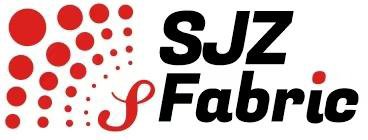The textile industry is largely based on fabric manufacturing companies that design, build, and furnish everything, including technical needs, apparel, and home furnishing. The choice of the appropriate fabric manufacturing firm is very important due to the fact that quality, sustainability, and innovation directly influence the performance of the products and the brand image. This paper discusses the 10 largest fabric companies in the world in 2025 by revenue, innovation, and market impact. Not only will you find out their strong points, the types of fabrics they deal with, their certifications and their specialties, but you will also know how to assess and select your ideal partner when it comes to fabric sourcing.
Top 10 Fabric Manufacturing Companies in the World in 2025
1. SJZ Fabric
SJZ Fabric is one of the best in fabric manufacturing companies, founded in 1992 and based in Guangdong, China. SJZ Fabric has established itself as one of the largest textile manufacturers with more than 30 years of experience, being one of the top three fabric firms in China and making a yearly sales revenue of more than 100 million RMB. Based on a 390,000m2 factory and employing over 155 craftsmen, the company has over 35 countries of export and manufactures a wide array of more than 40 fabrics of different qualities, such as cotton, synthetic blends, silk, linen, organza, and chiffon.
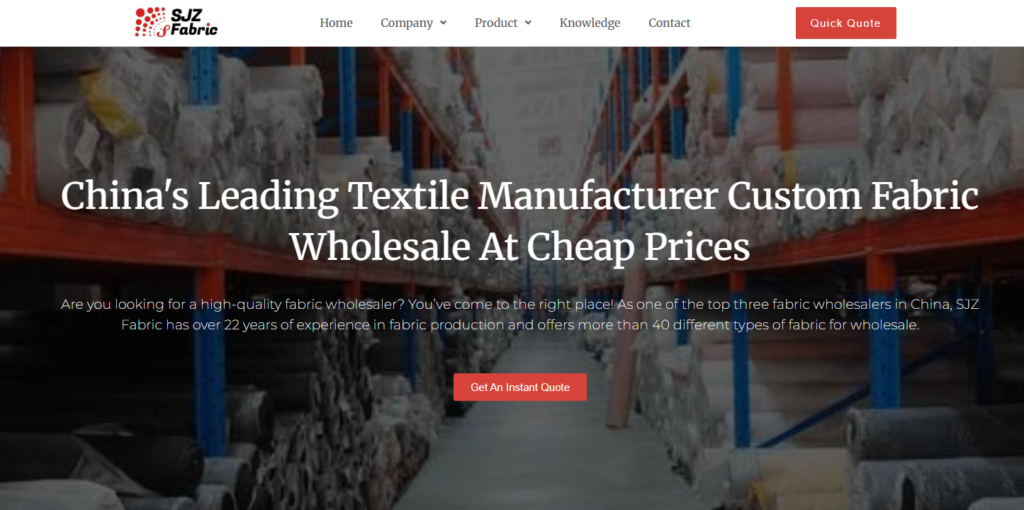
With the focus on a combination of innovation and the traditional craftsmanship, SJZ Fabric has introduced strict multi-level quality regulations to guarantee high tensile strength, colorfastness, breathability, and adherence to the international standards of safety. The clients enjoy free samples that give them an opportunity to make good decisions by evaluating texture, thickness, color accuracy, stretchability, abrasion resistance, and shrinkage in their applications.
The flexible shipping services include express delivery, less-than-container load (LCL), full-container load (FCL), sea freight, and air freight to guarantee a timely distribution around the world. Supported by a three-year warranty and after sales service through the entire life cycle of the product, SJZ Fabric is a bulk custom order manufacturer of clothing and home textiles, especially suiting mid-sized brands that value durability, fast production and sourcing with the proven manufacturing ecosystem of China, which is becoming more and more popular with innovative sustainable blends that use recycled materials.
2. Toray Industries, Inc.
Toray Industries, based in Tokyo, Japan, and founded in 1926, stands as a global giant in the field of advanced textiles, and with consolidated revenue of ¥2,563.3 billion during the fiscal year ended on March 31, 2025, it is a 4% increase over the previous year, with its fibers and textiles segment contributing greatly to the revenue with 1 trillion sales. As one of the leading fabric manufacturing companies, the firm is a global exporter of fibers, textiles and performance chemicals; operating in nylon, polyester, acrylic, carbon fiber composites and functional materials such as LIVMOA 9 breathable film, the company is making progress in sustainability through biomass-based and recycled fibers used in apparel, automotive, and industrial products.
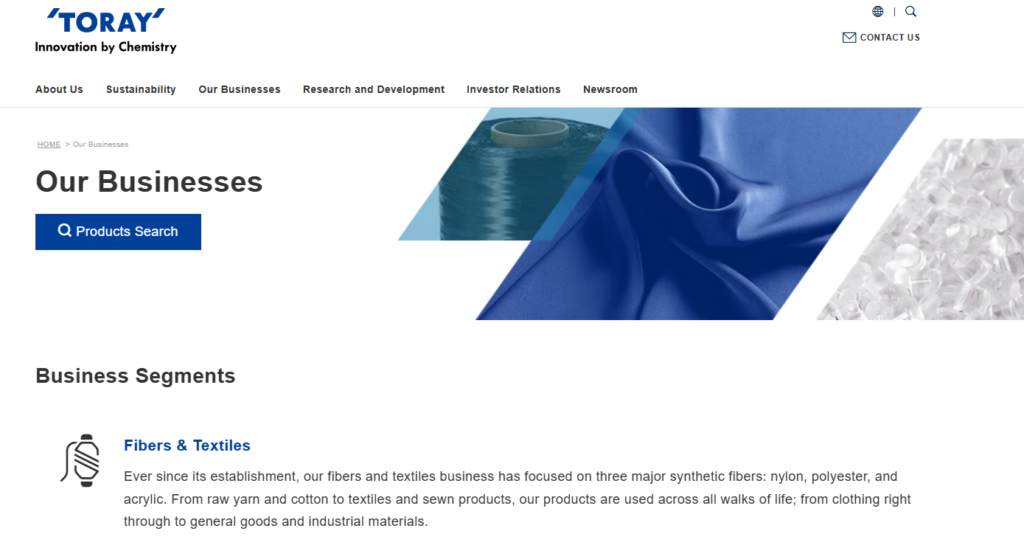
Some of the innovative technologies used in the production of synthetic fibers at Toray include health monitoring with embedded sensors in smart fabrics, recycled polyester lines that reduce carbon emissions by 30 percent, and the vertical integration of raw materials to finished products which ensures traceability.
High-performance testing includes durability, weather resistance, and moisture-wicking, backed by certifications like OEKO-TEX and ISO to guarantee quality, and international supply chains to support quick prototyping. Recent advances such as increased production of biomass fibers in 2025 are in line with the targets of net-zero and are more breathable and antimicrobial. This renders Toray best suited to high-technology uses in sportswear, car interiors and medical textiles where high-level functionality is paramount, as it serves the brands with scalable and sustainable solutions in a market that is expected to increase by 5 percent per year.
3. Lu Thai Textile Co., Ltd.
Lu Thai Textile one of the leading fabric manufacture companies, was founded in 1990 and is headquartered in Zibo, China and is the largest producer of high-end yarn-dyed fabrics in the world with an annual production of 220 million meters of yarn-dyed fabrics, 90 million meters of piece-dyed fabrics, and 30 million of shirts, projecting a yearly revenue of 6.5 billion CNY in 2025, up 6.67% over the previous year. Spinning to garment manufacturing, vertically integrated and using cotton, silk, wool, and chemical fibers, it exports high-quality products to major world brands with emphasis on design diversity in clothing and shirts.
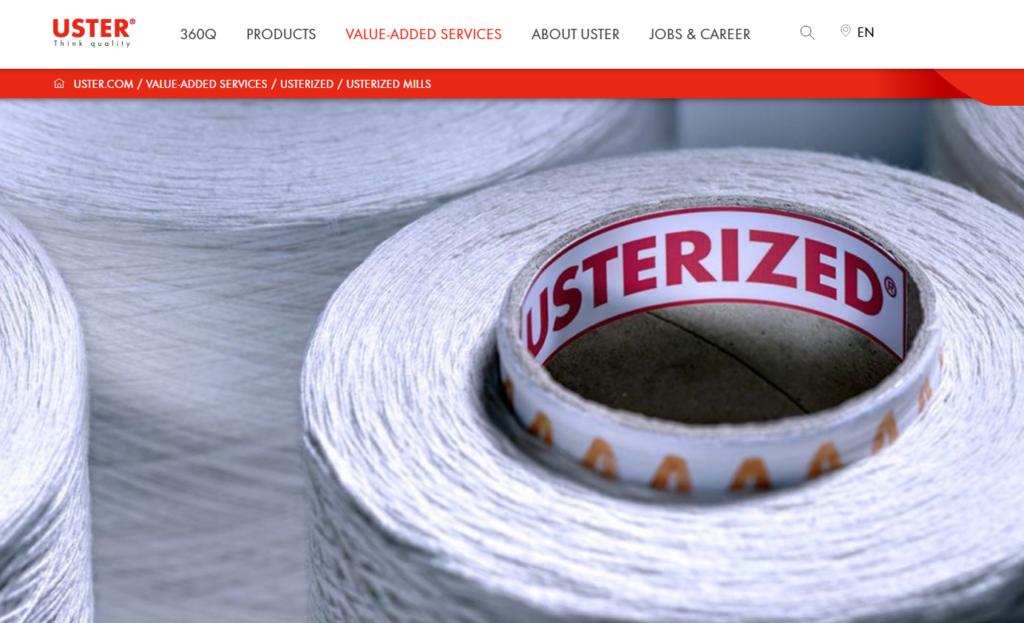
Lu Thai produces as many as 20,000 types of fabrics in a year and uses up-to-date dyeing and finishing techniques to achieve outstanding colorfastness, applies sustainable standards such as water recycling to reduce consumption by 40 percent, and is certified under OEKO-TEX. Powerful R&D leads to functional advancements like wrinkle-resistant and antimicrobial finishes, and quick and effective global logistics and custom design services help in quick market action.
During the first half of 2025, the operating revenue was 2.827 billion RMB, which showed a stable increase in the face of market difficulties. This makes Lu Thai the choice of high quality shirting and apparel fabrics, particularly to luxury brands that demand complex patterns, high volume, and consistent quality within a sector where the Asian powerhouse can guarantee affordable but innovative products.
4. Arvind Ltd.
Arvind Ltd. is a large integrated textile manufacturer based in Ahmedabad, India, founded in 1931 with estimated revenues of 80-90 billion (2025), with its operational growth of 10% in Q1 FY26 to 20.06 billion, principally due to 14% growth in its core textiles division. It specializes in denim, woven, knit, and garment fabrics, which are made of cotton, blends, and synthetics and are also involved in the export of these products to more than 50 countries having earned itself a name in the area of denim innovation in workwear and fashions.
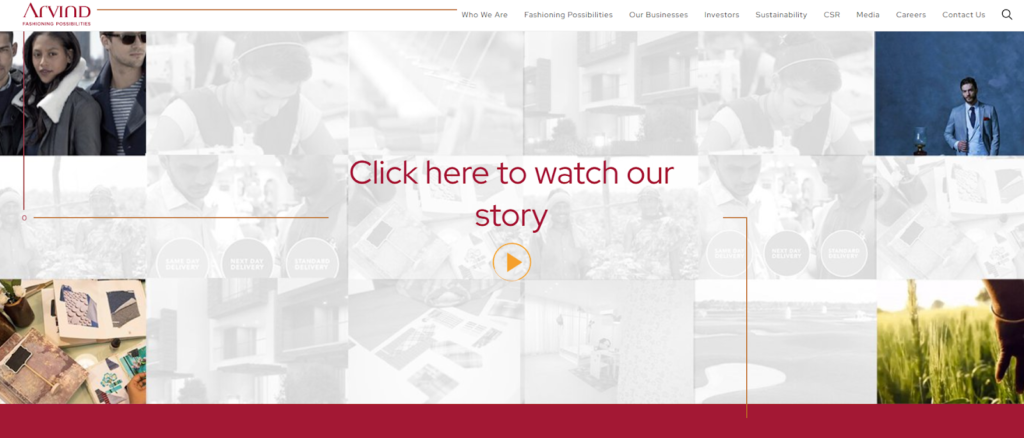
Being a sustainable denim leader, Arvind uses recycled water processes that save 1 billion liters of water per year, is BCI-certified as ethical cotton, and combines digital printing with laser finishing to create eco-friendly impacts. Vertical supply chain will provide responsive time, and performance tests guarantee fade resistance and stretch durability, supported by collaboration with such brands as Levi.
New investment in high-tech materials and garmenting of 500 crore has increased options to high-tech composites, and new technologies such as supercritical CO 2 dyeing have minimized environmental impact by 95 percent. This predisposes Arvind to denim and other casual wear goods, where fashion retailers focus on sustainability, innovative finishes, and scalable manufacturing in the Indian textile export market that has a valuation of $40 billion.
5. Shenzhou International Group Holdings Ltd.
Founded in 2000 and based in Ningbo, China, Shenzhou International is a leading manufacturer of knitwear and fabrics, with H1 2025 revenue of RMB 14.97 billion (up 15.3 per cent year-on-year) and forecasted 12-month revenue of $4.25 billion. It specializes in knitted clothing made of cotton, polyester and even blends and sells to major sportswear brands, which are exported to Europe and North America with vertical integration in large-scale factories with thousands of employees.
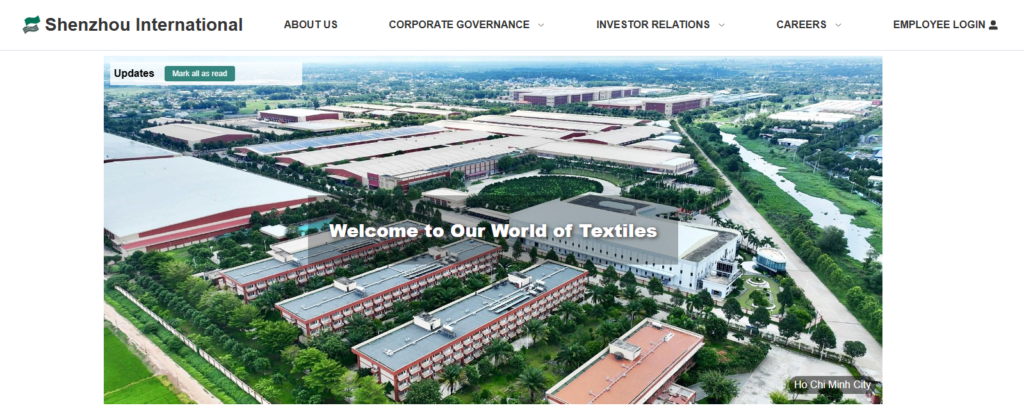
The high-tech knitting machines are used to create seamless fabrics, and the sustainable low-water dyeing corresponds to the GRS certification of recycled content. Quality controls of pilling resistance and elasticity are used in rapid prototyping and mass production, as well as in strong OEM services. Net profit increased 8.4 in 2025 to RMB 3.177 billion, which indicated resilience in unfavorable sales mix.
The focus of Shenzhou on functional textiles, including bio-based ones, places it perfectly to knitted activewear and sportswear, and serves brands such as Nike or Adidas that require scalable, performance-driven fabrics with high sustainability profiles in a global activewear sector that is growing at 7% CAGR.
6. Welspun India Ltd.
Welspun India is a home textile company, headquartered in Mumbai, India, established in 1985 and with revenues of 2025 above 10000 crore but Q1 experienced 11 per cent decline to 2261 crore due to market volatility. Its products are made of cotton, polyester, and blends into towels, bed sheets, rugs, and fabrics and are exported to 50 countries, with a weave such as Nano Core™ that creates anti-allergy properties and a specialization in organic/recycled materials.
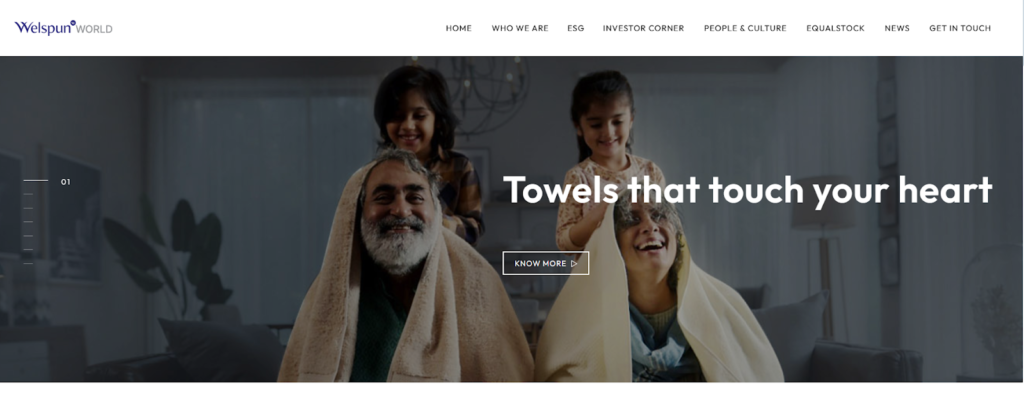
Welspun is certified by the Asthma and Allergy Foundation, where they use organic cotton and recycled polyester, advanced weaving to achieve better softness and durability and global warehousing to deliver goods fast. Wellness textiles R&D has absorbency and fade tests, and zero-waste projects have cut landfill by 90 percent. Growth of 11.7% YTD indicates the strength of Welspun, which targets to increase revenue to 100,000 crore in 3-5 years by making expansions. This makes it ideal in home textiles such as bedding and towels, and it aims at retailers that care about health, environmental sustainability, and comfort in a market where innovation is the driving force of 5 percent yearly growth.
7. Lenzing AG
Lenzing AG, founded in 1938, is based in Lenzing, Austria, and it pioneers sustainable cellulosic fibers, with H1 2025 revenue of EUR 1.34 billion (up 2% YoY) and EBITDA of EUR 268.6 million (up 63%). Using wood pulp to make lyocell, modal, and viscose, it exports biodegradable fabrics to more than 80 countries in apparel, home, and hygiene, and is determined to have a circular economy through biorefineries with minimum impact.
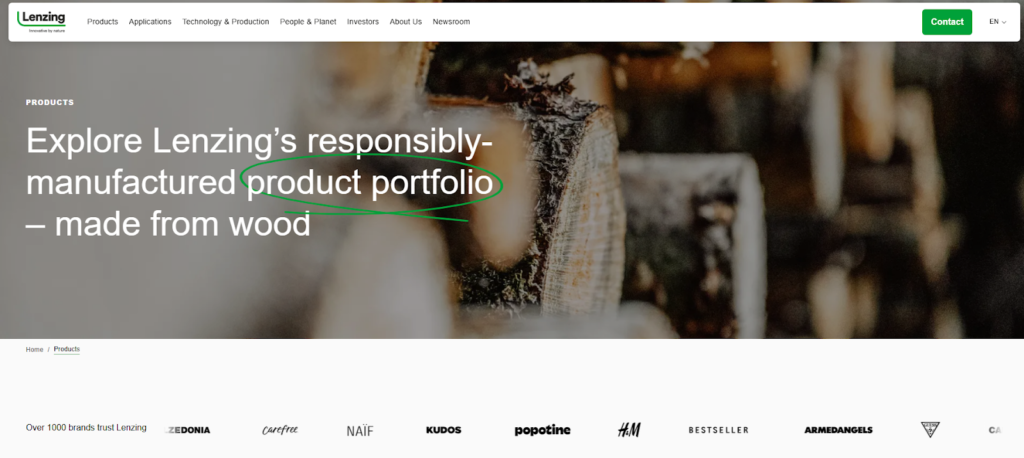
TENCEL branded fibers have better breathability and moisture control, and closed-loop manufacturing recycles 99% of solvents and is certified by the EU Ecolabel. Blended fabrics have innovations in the way of improved softness, which are backed by world technical support and performance indicators. Although recovery slowed due to tariff issues, Lenzing operational program increased profitability turning losses around. Perfect in sustainable clothing and nonwovens, it supports environmentally aware brands in fashion and personal care, and it is doing well in a market that is moving towards renewables with a forecasted increase of 6%.
8. Asahi Kasei Corporation
Asahi Kasei is a Tokyo, Japan-based, diversified giant founded in 1922 that has 2025 textile revenues of more than 2 billion and a consolidated sales of 2.7 trillion with Q1 operating income growth despite market pressures. It produces nonwovens, synthetic fiber and technical fabrics such as spandex and polyolefins, with export in automotive, electronic and medical applications and incorporating R&D in filtration and protective clothing. Roica spandex is elastic, the antimicrobial properties of nonwovens, and sustainable bio-based fiber are in agreement with ISO certifications.
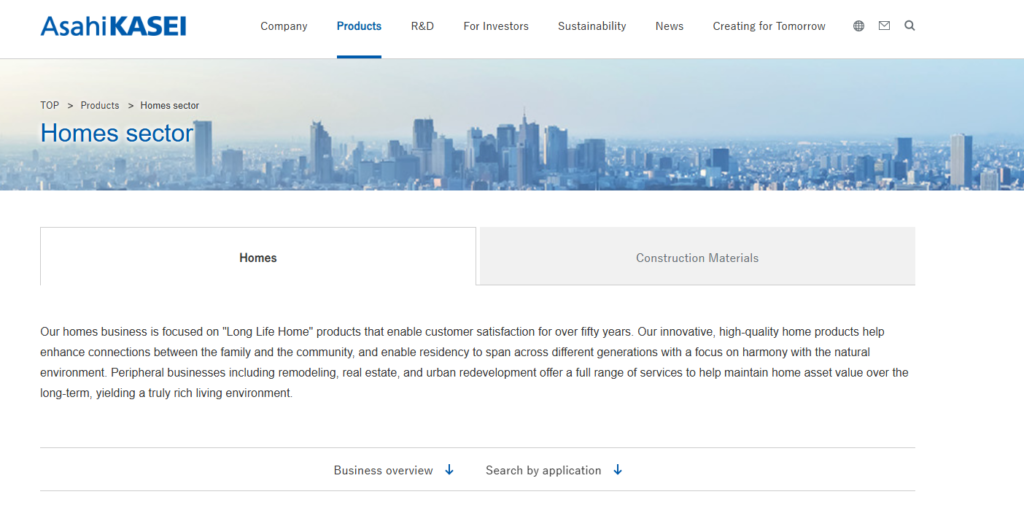
Stringent testing guarantees robustness and effectiveness and vertical integration leads to improved efficiency. In the future, battery separators and healthcare investments strengthen its portfolio, pushing it to record highs in segments in 2025. Best in technical textiles in automotive and medical applications, Asahi Kasei is a company that thrives where durability and specialized performance is essential, and that supports industries with the innovative and high-performance materials.
9. Milliken & Company
Founded in 1865 and headquartered in Spartanburg, South Carolina, USA, Milliken & Company is a US-based, privately held innovation leader with estimated 2025 revenues of $3.8 billion, in performance fabrics of nylon, polyester, and blends in industrial, flooring, and apparel markets. It operates globally, producing flame-retardant, antimicrobial and recycled fabrics with high-tech treatments, which is GRS certified and is striving to achieve net-zero by 2025.
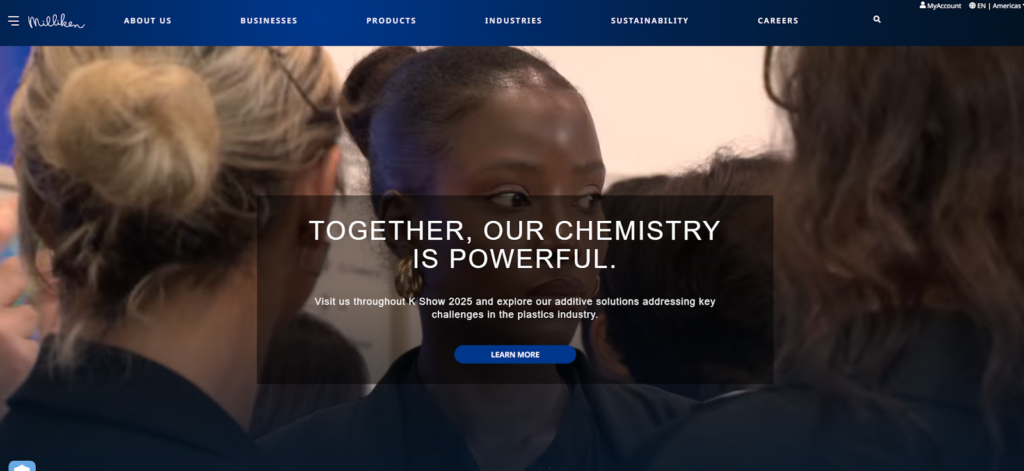
Famous brands such as Westex on protective clothing have zero-waste programs, smart fabric research and testing on flame resistance and comfort in a worldwide footprint. Milliken has been ranked among the Worlds Most Ethical Companies in the 19th consecutive year in 2025 and its diversified solutions have innovations in healthcare. This predisposes it best to industrial and protective fabrics in the healthcare and construction sector where safety, durability, and ethical manufacture are key in a 200-billion technical textile industry.
10. Hyosung Corporation
Hyosung Corporation, headquartered in Seoul, South Korea, was established in the year 1966 and is a major player in the chemical and textile industry with textile revenues of 2025 topping more than 2.5 billion USD exported to more than 90 countries as apparel, automotive, and industrial spandex (creora), nylon, and polyester yarns/fabrics.
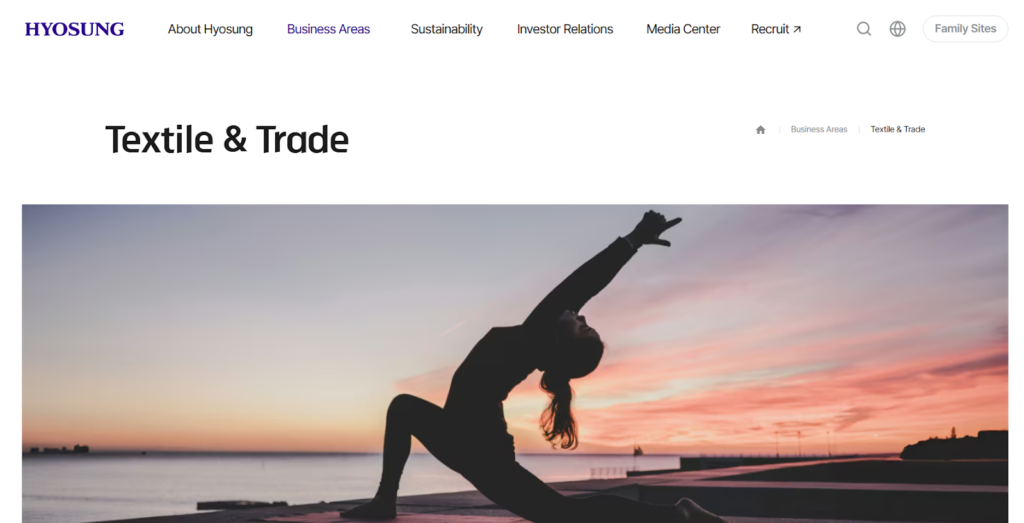
Being the largest producer of spandex in the world, it promotes bio-based and recycled solutions such as regen™ BIO Spandex which has a renewable composition, with advanced polymerization to achieve high stretch recovery, and OEKO-TEX certification. Innovations are facilitated by global R&D centers, like sustainable fiber solutions, displayed at Premiere Vision Paris 2025, including circular polyester made of textile waste in alliances with Loop Industries. Characteristics such as high-elasticity materials that are low in environmental impact are durability tested. Hyosung works well with sportswear and intimates that need a high level of stretch, recovery, and sustainability in a market that focuses on circular trends.
Comparison Table Of The Top 10 Fabric Manufacturing Companies
| Company | Established | Headquarters | Revenue (2025) | Key Fabrics | Export Countries | Sustainability Focus | Key Certifications | Best For |
| SJZ Fabric | 1992 | Guangdong, China | >100M RMB | Cotton, silk, linen, organza, chiffon, blends | 35+ | Eco-friendly blends, recycled materials | OEKO-TEX | Bulk apparel, home textiles |
| Toray Industries, Inc. | 1926 | Tokyo, Japan | ¥1T (textiles) | Nylon, polyester, acrylic, carbon fiber | 100+ | Biomass, recycled polyester, 30% CO2 cut | OEKO-TEX, ISO | High-tech sportswear, automotive, medical |
| Lu Thai Textile Co., Ltd. | 1990 | Zibo, China | 6.5B CNY | Cotton, silk, wool, yarn-dyed fabrics | 50+ | Water recycling (40% less), eco-dyeing | OEKO-TEX, GOTS | Premium shirting, luxury apparel |
| Arvind Ltd. | 1931 | Ahmedabad, India | ₹80-90B | Denim, cotton, blends, knits | 50+ | BCI cotton, 1B liters water saved | BCI, GRS | Denim, casual wear, sustainable fashion |
| Shenzhou International | 2000 | Ningbo, China | $4.25B | Knitted cotton, polyester, blends | 30+ | Low-water dyeing, recycled content | GRS, OEKO-TEX | Activewear, sportswear |
| Welspun India Ltd. | 1985 | Mumbai, India | >₹10,000 crore | Cotton, polyester, blends for home textiles | 50+ | Organic cotton, zero-waste, recycled fibers | Asthma & Allergy, GRS | Bedding, towels, wellness textiles |
| Lenzing AG | 1938 | Lenzing, Austria | €2.68B | Lyocell, modal, viscose | 80+ | 99% solvent recycling, biodegradable fibers | EU Ecolabel, GOTS | Sustainable apparel, nonwovens |
| Asahi Kasei Corporation | 1922 | Tokyo, Japan | $2B (textiles) | Spandex, nonwovens, polyolefins | 70+ | Bio-based fibers, low-impact production | ISO, OEKO-TEX | Technical textiles, automotive, medical |
| Milliken & Company | 1865 | Spartanburg, SC, USA | $3.8B | Nylon, polyester, flame-retardant fabrics | 60+ | Net-zero by 2025, recycled fabrics | GRS, Ethical Company Award | Industrial, protective fabrics |
| Hyosung Corporation | 1966 | Seoul, South Korea | $2.5B (textiles) | Spandex, nylon, polyester, recycled yarns | 90+ | Recycled spandex, circular polyester | OEKO-TEX, GRS | Elastic sportswear, intimates |
How to Find the Best Quality Fabric Manufacturing Companies
You can always get consistent quality and reliable delivery as well as long term business success when you find the right fabric manufacturing company. There are several considerations to be made when selecting a supplier.
Industry Reports and Databases
Begin with the research of such sources as Statista, Expert Market Research, and Verified Market Reports. These platforms offer ratings according to revenue, volume of production, and sustainability performance. Compare this data with trade associations including the International Textile Manufacturers Federation (ITMF) to confirm its accuracy.
Assess Certifications and Standards
Seek out the companies that are adhering to the international standards. Certifications such as OEKO-TEX provide safety of fabrics, GOTS is an organic standard, ISO 9001 is a strong quality management, and Bluesign is an environmental friendly production. Always ensure that all regulations like REACH in Europe or CPSIA in the United States are adhered to.
Evaluate Production Capabilities
You are expected to research the size of operations in the company. Capability is reflected in factors such as the size of a factory, the strength of employees and the machines such as air-jet looms or digital dyeing units. Vertical integration companies tend to have a higher quality control over raw materials to the final products.
Read Customer Reviews and Case Studies
Find reviews on Alibaba, ThomasNet or LinkedIn. The apparel, automotive, or medical brands offer testimonials that show how the fabrics perform in a real-life situation. Pay attention to the comments on durability, colorfastness, and reliability of delivery.
Take into account Sustainability and Ethics
Contemporary consumers appreciate environmentally-friendly behaviours. Look at carbon footprint, water use, and labor standards reports of companies such as the Ellen MacArthur Foundation or Fair Wear Foundation. Prefer suppliers who use recycled fibers, renewable energy or clear labor policies.
Supply Chain and Global Reach Analysis
A good partner must have high export capabilities. Check the reach and reliability of logistics using trade data tools such as Panjiva. Enquire whether they have flexible shipping options including FCL or air transport to your area.
Test Samples and Compare Pricing
A sample should always be requested to check texture, tensile strength, breathability and resistance to shrinkage. Abrasion and safety lab testing is an additional safety measure. Price versus quality; the lowest price can be at the cost of standards.
Conclusion
The top fabric manufacturing companies of 2025 explain how the global textile market is characterized by sustainability, innovation, and quality. The industry is based on eco-friendly fibers, the latest smart textile, and these leaders. Sourcing is going to keep being transformed by new technologies like design by AI, blockchain traceability, and bio-engineered fabrics. Regarding suppliers apply the explained criteria on certification, production capacity, and sustainability. Through this, you will be able to find partners whom you can depend on and you will be able to assist in developing a more sustainable global fabric economy.
